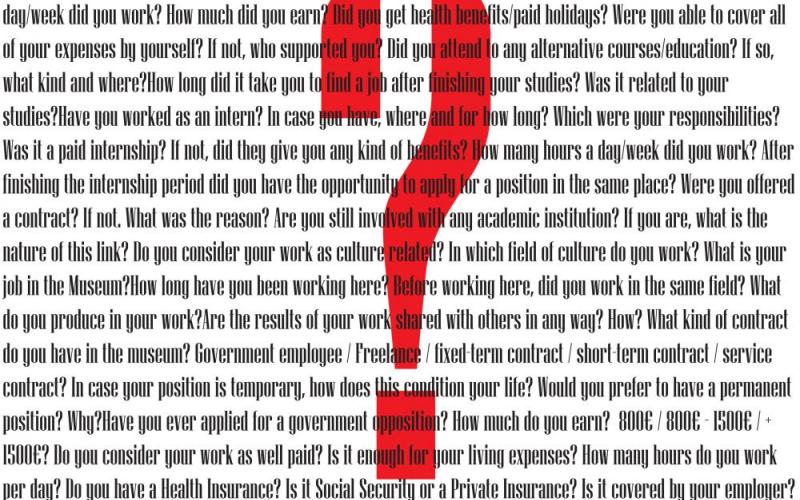In the engine room: working conditions for cultural workers, Meeting in the Cultural Center REX, Belgrade
Cultural Center Rex, Belgrade, Jevrejska 16
http://www.rex.b92.net/en.html
Sunday 26 June, 6 pm
Monday, 27 June, 7 pm
Cultural Center Rex invites you to a meeting, presentation and discussion with groups of cultural workers from Spain, Slovenia and Serbia. The common theme of the gathering, bringing together the Radical Education Collective, Workers' Inquiry Group and their Serbian colleagues, scheduled for Sunday and Monday evening at REX is the working conditions for cultural workers.
The Workers' Inquiry Group are Alfredo Aracil, Carolina Bustamante, Ines Moreno and Yunuen Sarieg, Ph.D. students attending the course at the Centro de Estudios of the Museo Nacional Centro de Arte Reina Sofia in Madrid. Together with the Radical Education Collective (Ljubljana, Slovenia, http://radical.temp.si/), they have initiated research into the forms and different levels of exploitation of the people working in cultural institutions, as well as the ways in which the results of this research can be applied with the aim of bringing about social change. The research process began by raising the question of how to come up with new political practice and formulate it from within institutions. The reasons for conducting this research go beyond the new forms of work in culture and the need to regulate work standards in the cultural domain (such as the discrepancy between the amount of paid and unpaid work and leisure, intensive fragmentation of the work experience, the loss of self-confidence, independence and the sense of safety in all aspects of life) and include the lack of class consciousness and solidarity among cultural workers who are the new proletariat.
Aleksandra Sekulić, Jelena Miletić, Vladan Jeremić, Vida Knežević and Marko Miletić are cultural workers and artists from Belgrade and Bor who have until recently been employed in different state-funded cultural institutions or worked there on a basis of temporary service agreements. All of them experienced a demanding and exhausting process of putting forward and implementing their ideas, as part of everyday activities and institutional production. This process was usually marked by different kinds of passive resistance, obstruction, disregard and even harassment by the management of these institutions. In an attempt to be the frontrunners of modernization of the program and cultural production, these people were left isolated, ostracised and their efforts thwarted. In the end, they were fired or forced to quit their jobs. The similarities and differences between these isolated cases are indicative not only of the trend of political oppression in the cultural sphere but also of the fact that no organization, association or trade union offered support to the protagonists of these events either at an institutional or professional level.
The members of the organization KUDA.org and Alternativni kulturni centar (Alternative Cultural centre) (Niš) will take part in the meeting and discussion about other kinds of work experiences where people's physical and personal integrity or the public image of their organization is threatened, as well as about the resulting legal, police and judicial procedures that relativized or minimized such experiences.
The situations that these cultural workers have experienced, as well as one of the critical situations at the University of Arts in Belgrade at the time (namely, firing temporary teaching staff) were discussed as part of the Mission Barely Possible event held on 24 February 2011 at the REX cultural center. The impressions from the discussion can be found at: www.rex.b92.net/mvm.
These groups of cultural workers will first meet at REX on Sunday, 26 June at 6 pm to exchange their experiences and share ideas about possible forms of cooperation. The meeting will be open to all workers in culture-based occupations, interested in the topic in question. We believe that this is an opportunity for those actively contributing to the two fields of cultural policy and production, the one belonging to the public sector and its counterpart that is regarded as independent, to meet and get to know each other.
On Monday 27 June, the Workers' Inquiry Group and Radical Education Collective will hold a presentation of their research (a survey of cultural workers conducted at the Reina Sofia museum), its principles, and its outcome up to the present.
The meetings and debates belong to the Crossroads East West intercultural dialogue program, implemented as part of Engine Room Europe, a three-year project focusing on independent cultural workers and their field of activity. The main aim of the project is to enhance the capacity and sustainability of independent culture in Europe. The project is carried out with the support of the European Commission.


